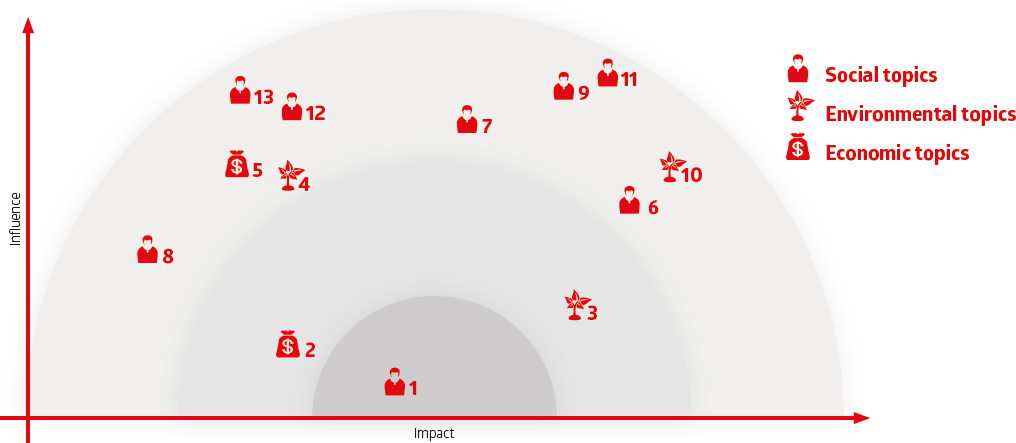About this report
About this report
![]() PREPARED BASED ON THE GRI-G4 INDICATORS, THIS REPORT IS ALIGNED WITH THE PRINCIPLES OF THE UN GLOBAL COMPACT, TO WHICH ETERNIT IS A SIGNATORY SINCE 2007
PREPARED BASED ON THE GRI-G4 INDICATORS, THIS REPORT IS ALIGNED WITH THE PRINCIPLES OF THE UN GLOBAL COMPACT, TO WHICH ETERNIT IS A SIGNATORY SINCE 2007
This report covers the economic, environmental and social performance of Eternit S.A. and its three subsidiaries (SAMA S.A. Minerações Associadas, Precon Goiás Industrial Ltda. and Tégula Soluções para Telhados Ltda.) in the period from January 1 to December 31, 2015. The result of Companhia Sulamericana de Cerâmica (CSC), a joint venture between Eternit and Companhia Colombiana de Cerâmica S.A., was considered in the consolidated financial information based on the equity pickup method, as established by CPC 19R2 (IFRS 11) on joint arrangements, due to the fact that the shareholders (Eternit S.A. and Companhia Colombiana de Cerâmica S.A.) exercise joint control. This report also does not consider the result of the unit for the research, development and production of construction material inputs, Eternit da Amazônia Indústria de Fibrocimento Ltda., located in Manaus, Amazonas, given that it was under implementation during 2015. It also provides details on the operational dynamics in the areas of corporate governance, capital markets and strategic and operating areas, such as risk management and compliance.
This material was prepared in accordance with version GRI-G4, under the comprehensive option, and is aligned with the principles of the Global Compact and the Millennium Goals of the United Nations (UN), to which Eternit is a signatory since 2007. The social and environmental data was not subjected to external verification. The report's preparation also considered the recommendations of the Brazilian Association of Publicly Traded Companies (ABRASCA), Brazilian Institute of Social and Economic Analyses (IBASE), Brazilian Accounting Standard NBCT 15 and International Financial Reporting Standards (IFRS). When applicable, the indicators can be compared with those for 2014, that were reported in the previous edition of this report.
Materiality matrix
If you have any questions or want more information, please contact: ri@eternit.com.br
The preparation of this Report is based on the sustainability topics of importance to the Company in its interactions with stakeholders, as identified in the materiality matrix conducted in 2015 for the 2014 report, as part of its strategic planning. The same matrix was used for the 2015 report.
Internal and external stakeholders participated in the survey: members of Eternit's senior management, employees, capital market investors and analysts, clients, suppliers and trade associations and unions. All contacts involved groups selected based on the importance of their relationship with the Company, which supported the high level and high quality response to the survey. The senior management, which includes Officers and the Chief Executive Officer, contributed to the process by participating in all phases and by validating the final result.
The Company also maintains information targeting various stakeholders on its corporate website (www.eternit.com.br) and Investor Relations website (www.eternit.com.br/ir).
02. Economic performance
03. Management of emissions,
03. wastewater and solid waste
04. Management of materials consumption
04. and optimization of resources
06. Consumer health and safety
07. Employment and labor relations
08. Customer satisfaction and labeling
09. Impacts on people’s lives
10. Biodiversity management and impact
11. and unfair competition
12. Freedom of association
12. and collective bargaining
13. Training, talent development
13. and diversity
